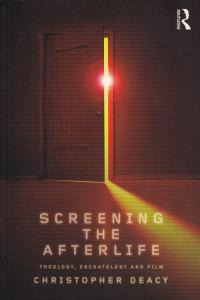 Theology has never been my thing. Now, those who don’t parse things too finely may find that an odd statement. “This blog almost always addresses religion,” they may say, “how can you say theology’s not your thing?” Perhaps for the layperson “theology” means anything having to do with religion. In the biz it has a more specific meaning. Theology is tied to a faith system. It tries to explain, rationally, what that belief system entails. Religious studies is more about studying what religion is and how it works. It was this fine distinction that put me off from reading Screening the Afterlife: Theology, Eschatology and Film. Christopher Deacy treats the subject theologically and, depending on the theologian, that can mean a lot of effort for little result. I was, however, pleased about a number of things in Deacy’s book. He doesn’t shy away from horror, for one. And he takes cinema seriously.
Theology has never been my thing. Now, those who don’t parse things too finely may find that an odd statement. “This blog almost always addresses religion,” they may say, “how can you say theology’s not your thing?” Perhaps for the layperson “theology” means anything having to do with religion. In the biz it has a more specific meaning. Theology is tied to a faith system. It tries to explain, rationally, what that belief system entails. Religious studies is more about studying what religion is and how it works. It was this fine distinction that put me off from reading Screening the Afterlife: Theology, Eschatology and Film. Christopher Deacy treats the subject theologically and, depending on the theologian, that can mean a lot of effort for little result. I was, however, pleased about a number of things in Deacy’s book. He doesn’t shy away from horror, for one. And he takes cinema seriously.
The idea behind the book is straightforward—theology and movies should be in dialog about the afterlife. At a number of points Deacy makes it clear that films reach a wider audience than theology books. Again, those of us in the biz know that to be very true. If people watch movies they begin to accept what those movies tell them as true. For those of one of the established faith systems, if things haven’t altered all the much since I was young, discussing the religious meaning of a secular film is always interesting. (Some of my friends drew the line, however, when I found Elijah parallels in a film where a bread machine went out of control, but that’s a story for another time.) People take movies seriously. During economically depressed times, movies thrive. We need to pay attention to them.
The problem with theology is, no matter how open it may be, there’s always some element of rightness involved—this perspective is right and that one wrong. It can hardly be any other way. To open the door too widely is to invite yourself to exit. Deacy selects films he finds theologically meaningful when addressing (mostly) Christian views of the afterlife. I’m guessing—and it’s only a guess—that many people get their information from popular media and theologians are completely off the screen. That doesn’t mean theology has no place, but it does mean that its place is in the hands of other scholars rather than those who just want to sit around and talk about the film they saw last night. Both may be profound, but one is more clearly enjoyable than the other.
